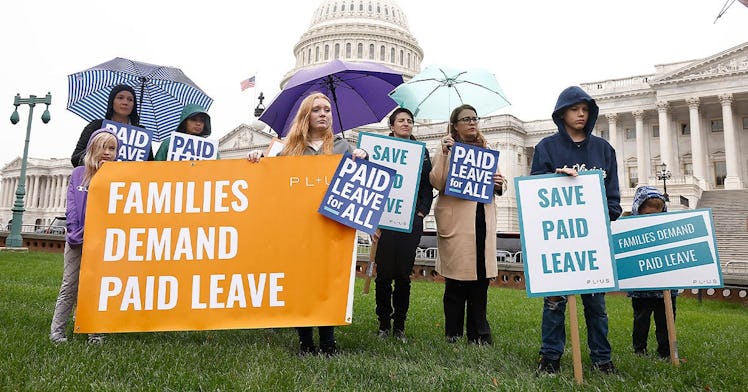Hooray! Paid Leave, Free Pre-K, and More Just Got Approved by the House
It's an important step forward, but there's a long way to go. So what's next?

The House voted on Friday morning to pass the Biden administration’s signature Build Back Better Act, a potentially momentous, relatively ambitious piece of legislation sold as a corrective to massive inequality, global pandemic, and climate disaster. And though it faces a tough road in an evenly divided Senate, the occasion is one to celebrate for national Democrats—but only a little bit.
After the Congressional Budget Office released its analysis of the bill, estimating that it would actually decrease the deficit over the next decade, enough conservative House Democrats signaled that they would vote yes to bring the bill to a vote on Thursday night. House Majority Leader Kevin McCarthy interrupted those plans with a record-breaking eight-and-a-half hour airing of grievances that lasted through the night, delaying the vote until Friday morning when it passed 220-213.
It’s a big step forward with a long way to go. Here’s what you need to know about where the things with the Build Back Better Act stand now.
What’s in the bill?
What was included and excluded in the bill shifted many, many times over the past few months of negotiations. And if the bill does eventually pass the Senate, the chances that the version that makes it to Biden’s desk is identical to the version the House passed last night are slim.
That being said, the bill passed last night sets the baseline for the next phase of negotiations, which means it’s a big deal. Here are the spending items most relevant to families:
- $27s billion for childcare, including higher wages for workers and caps on what low-income families have to pay for childcare
- $205 billion to provide four weeks of federal paid family and medical leave for all workers starting in 2024, bringing the policy back from the dead
- $184 billion for a one-year extension of the expanded child tax credit and permanent refundability
- $109 for universal pre-K for three- and four-year-olds
- $10 billion for to feed kids by expanding free school lunch eligibility and summer meal benefits
The rest of the bill includes half a billion in climate investment, $401 billion for healthcare, $166 billion for housing, and $133 billion for immigration. It’s all paid for by a combination of beefing up IRS enforcement tax laws for wealthy tax avoiders, increasing taxes on businesses and rich people, Medicare reform (including allowing the government to—finally—negotiate prices for covered medication), and other revenue-raising measures.
What’s the next step in the process?
The bill now moves to the Senate, where it can be passed with a simple majority via budget reconciliation. With zero chance of attracting a GOP vote, Majority Leader Chuck Schumer has to ensure that every Democratic Senator, including conservatives Joe Manchin and Kyrsten Sinema, votes yes in order to pass the bill into law.
Another hurdle for Schumer and company: the Senate Parliamentarian. They heeded her non-binding guidance before in removing a minimum wage hike from a reconciliation bill last year because she said it didn’t qualify under her interpretation of the rules.
If she takes issue with anything in the bill passed by the House, Senate Democrats will be faced with either cutting it from the legislation and risking losing progressive support or ignoring her guidance and risking losing the support of Manchin and/or Sinema in the Senate.
Will it pass?
It’s impossible to know exactly what it going to happen next, but it does seem unwise for Democrats to celebrate prematurely. Slate reports that Sinema’s objections have mostly been ironed out, but that still leaves the tall task of getting Joe Manchin to yes. His political beliefs and incentives are different from that of other national Democrats, and while the CBO score probably nudges him toward the affirmative the high rate of inflation, which he’s already sounding the alarm on, does the opposite.
Here’s hoping that much-needed relief might finally be on the way.